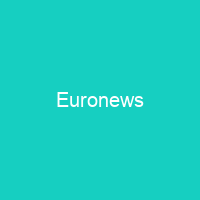Euronews: A Pan-European Beacon of News
Imagine a world where news is not just broadcast but shared across borders and languages, bringing people together in their quest for knowledge and understanding. That’s exactly what Euronews has been doing since its inception on January 1, 1993. Based in Lyon, France, this pan-European television network has grown from a small idea into a powerhouse of information, serving Europe and North Africa via satellite, as well as globally through the internet.
The Genesis of Euronews
In 1992, the European Broadcasting Union (EBU) had a vision to create a news channel that would present information from a European perspective. This was no small feat; it required a consortium of ten founding members, including the Swiss public broadcaster SRG SSR, which joined later as a non-founding member.
Expansion and Growth
Euronews has come a long way since its humble beginnings. Over the years, it has expanded its services to include new languages such as Turkish (2010), Persian (2010), Ukrainian (2011), and even launched an Arabic-language service in 2008. These expansions have made Euronews a truly global news network, reaching millions of households across Europe and beyond.
Ownership and Partnerships
The ownership structure of Euronews has seen several changes over the years. In 2015, Media Globe Networks acquired a 53% stake in the channel, raising concerns about editorial independence. Then, in 2017, NBCUniversal stepped in with a 25% stake for €25 million, bringing in new resources and expertise. However, by 2019, financial troubles led to NBCUniversal selling its stake back to Media Globe Networks for just €3 million.
Current Ownership
In December 2021, French newspaper Libération reported that Euronews had been acquired by Lisbon-based Alpac Capital. This acquisition was partly financed by the Hungarian state and raised eyebrows due to potential conflicts of interest. Despite these concerns, Euronews CEO Michael Peters assured that editorial independence would be maintained.
Programming and Content
Euronews offers a wide range of programming, from news segments and talk shows to documentaries and cultural content. The channel has faced challenges in recent years, including the discontinuation of some popular shows like ‘Good Morning Europe’ and ‘Euronews Tonight.’ However, it continues to innovate with new weekly programming such as the interview series Uncut and a social media unit producing The Cube.
Notable Moments
Euronews has made significant scoops, including live coverage from the MV Aquarius during the Mediterranean migrant crisis. This coverage gained international attention and boosted Euronews’s credibility. The channel also invested in mobile reporting via iPhone devices and hired new correspondents worldwide.
Future Directions
Euronews has plans to relocate its headquarters to Brussels, creating new positions while eliminating 198 staff in Lyon. This move has faced criticism from the French National Syndicate of Journalists union, who argue that it will weaken pluralism. Despite these challenges, Euronews remains committed to providing a diverse and comprehensive news service.
Conclusion
Euronews stands as a testament to the power of cross-border collaboration in journalism. From its founding vision to its current ownership structure, the network has evolved significantly while maintaining its commitment to delivering high-quality, European-centric news. As it looks to the future, Euronews continues to navigate challenges and adapt to changing media landscapes, ensuring that its beacon of information remains a vital resource for millions.

You want to know more about Euronews?
This page is based on the article Euronews published in Wikipedia (retrieved on February 13, 2025) and was automatically summarized using artificial intelligence.





